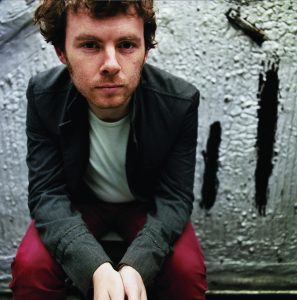A Harvest of New Music to Savor at SummerFest

Composer Gabriel Kahane (courtesy of the composer)
While still a conservatory student, the young American composer Samuel Barber wrote “Dover Beach,” a substantial piece for string quartet and baritone soloist, which became a calling card for a musical career that soared quickly. Friday’s La Jolla SummerFest 2012 concert of commissions and premières opened with Gabriel Kahane’s “Come On All You Ghosts,” another solo vocal work with string quartet accompaniment, which the 31-year-old composer completed last year.
Given their first-glance similarities, these two pieces chart the great distance between today’s classical music ethos and that of 80 years ago. Barber chose the poetry of Matthew Arnold, the respected English Victorian poet, and wrote the piece for himself, an operatically trained singer, to perform. Kahane chose the poetry of Matthew Zapruder, a hip, contemporary San Francisco poet, and also composed his piece for himself, a lithe, pop-style singer whose left hand is welded to the microphone.
Each poet considers—in his own fashion—the topic of loneliness, but Arnold’s thoughts are stimulated by the view of the calm sea at Dover Beach, while Zapruder’s are set off while contemplating a can of Diet Coke.
Then and now.
In spite of the world of difference between these two composers, I thought of Barber while listening to Kahane’s agile, evocative string writing, on which the Calder Quartet lavished its opulent sonority and suave phrasing. Kahane’s harmonic vocabulary is not that distant from Barber’s, although cluttered with far less chromaticism and indulging in bent pitches, slurs and portamentos that Barber would have thought bad form.
I was not as taken with Kahane’s vocal line, a perky, perpetual arioso that is neither memorable nor heart-tugging, but it does express Zapruder’s casual sophistication efficiently. I predict someone will throw an opera commission in Kahane’s direction sooner rather than later, and then we will see how deep his well of vocal inspiration goes.
One of SummerFest’s commissions, Aaron Jay Kernis’ “Perpetual Chaconne” for string quartet and clarinet, did engage both heart and mind in a powerful fashion. A single-movement, 20-minute essay built on a dark, modal chord progression, “Perpetual Chaconne” deftly alternated highly agitated textures with haunting, lyrical reveries.
Kernis favors ideas that are taut and layered, rather than angular and contrapuntal, yet ample energy erupts from his tightly organized modules. Again, the Calder Quartet’s refinement and zeal gave the work everything it needed, and clarientist John Bruce Yeh’s exuberant solo work was nothing less than astounding.
Some classical clarinetists appear to avoid the instrument’s chronic squawks by always playing with guarded restraint on the quiet side, but Yeh’s smooth technique fearlessly moves into every dynamic extreme without blemish. I am thankful that Yeh resides and performs in Chicago, because if I heard him play regularly in San Diego, I would have to admit that I like the clarinet.
In his short introduction to “Perpetual Chaconne,” Kernis explained that because it was co-commissioned by Chamber Music Northwest, its first performance had been two weeks ago in Portland. The Sherwood Auditorium audience gave this second performance a rousing reception, which put a jubilant smile on the soft-spoken composer’s countenance.
The concert’s sole world première, Marc-André Dalbavie’s Quartet for Piano and Strings, brought to mind the music of Olivier Messiaen because of its sustained dense harmonies and transparent textures. Like the Kernis work, it is a single movement of about 20 minutes duration, one that alternates moods of stasis and passionate outbursts.
But unlike the Kernis, whose changes seemed logical and consequential, Dalbavie’s unexpected mood swings suggested Robert Schumann’s bi-polar surprises. With Jeremy Denk at piano, violinist Yura Lee, violist Paul Neubauer, and cellist Felix Fan, Dalbavie’s new opus spoke with authority and confidence. I look forward to encountering more complex, colorful music from this little-known—at least in North America—French composer.
Seizing upon her idea of having two distinct chamber ensembles engage in both combat and cooperation, American composer Ellen Taafe Zwilich spelled out her formula in the title: Septet for Piano Trio and String Quartet (2008). A big-boned, rigorously organized work in four distinct movements, her Septet displayed the structural polish and thematic concision of a composer enjoying her eighth decade.
In the opening movement, titled “Introductions,” the piano trio (here the Newbury Trio) immediately took the offensive with assertive, declamatory counterpoint, almost defying the members of the Amphion String Quartet to attempt to join them. The Amphion players pleaded with short, soft entreaties, and eventually built up their courage to enter the fray.
The second movement, “Quasi una Passacaglia,” realigned the instrumentalists so that the three violinists played in unison, the lower strings joined together, and the piano staked out its own territory with one of the cellos, like a Baroque basso continuo, a logical choice for that quintessential Baroque genre, the passacaglia.
Zwilich abandoned her clever Baroque pastiche in the third movement, “Games,” which struck me as a vivacious, jazz-inflected scherzo, but her finale, “Au Revoir,” lacked the rousing conclusion I expected from the rigour of the previous movements. Overall, however, it was a piece I would gladly entertain again for its zest and clever juxtaposition of instrumental roles.
A SummerFest programming staple, the Commissions and Premières concert has fluctuated in quality from year to year, but I thought 2012 was one of the more substantial and rewarding offerings in recent years. And for those of us who appreciate challenge as much as comfort in music performance, this program combined with last week’s Tan Dun “Water Passion” puts SummerFest 2012 head and shoulders above any SummerFest I can recall.

Here’s another virtuoso clarinetist who never squawks: http://www.sfcmf.org/artist-profile/chen-halevi-clarinet
Messiaenic. Definitely.
Another thought. If we were hearing classical music with voice, Summerfest would provide the audience with the texts. I would appreciate having access to the texts of Gabriel Kahane’s songs also, as I was unable to hear the words.